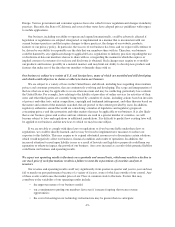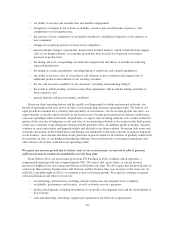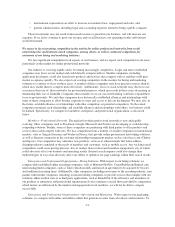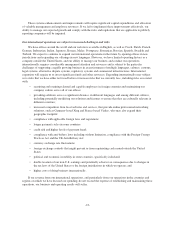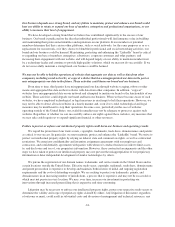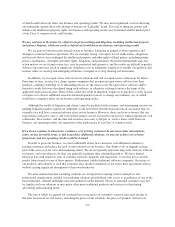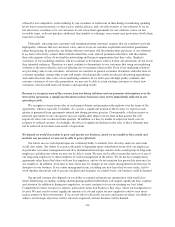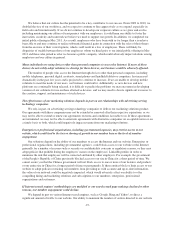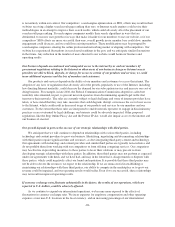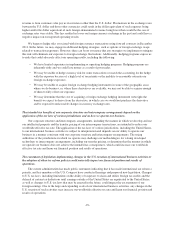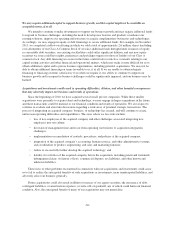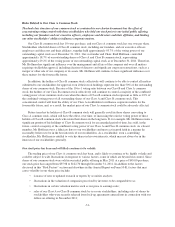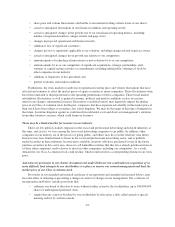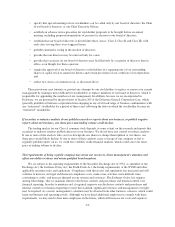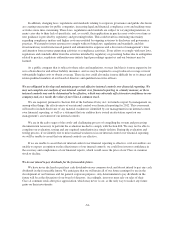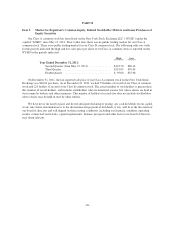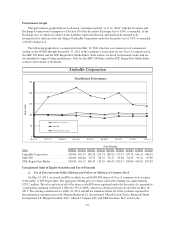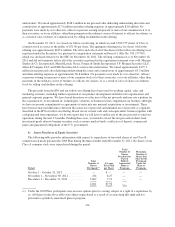LinkedIn 2011 Annual Report Download - page 32
Download and view the complete annual report
Please find page 32 of the 2011 LinkedIn annual report below. You can navigate through the pages in the report by either clicking on the pages listed below, or by using the keyword search tool below to find specific information within the annual report.is not entirely within our control. Our competitors’ search engine optimization, or SEO, efforts may result in their
websites receiving a higher search result page ranking than ours, or Internet search engines could revise their
methodologies in an attempt to improve their search results, which could adversely affect the placement of our
search result page ranking. If search engine companies modify their search algorithms in ways that are
detrimental to our new user growth or in ways that make it harder for our members to use our website, or if our
competitors’ SEO efforts are more successful than ours, overall growth in our member base could slow, member
engagement could decrease, and we could lose existing members. These modifications may be prompted by
search engine companies entering the online professional networking market or aligning with competitors. Our
website has experienced fluctuations in search result rankings in the past, and we anticipate similar fluctuations
in the future. Any reduction in the number of users directed to our website would harm our business and
operating results.
Our business depends on continued and unimpeded access to the internet by us and our members. If
government regulations relating to the Internet or other areas of our business change or Internet access
providers are able to block, degrade, or charge for access to certain of our products and services, we could
incur additional expenses and the loss of members and customers.
Our products and services depend on the ability of our members and customers to access the internet. The
adoption of any laws or regulations that adversely affect the growth, popularity or use of the Internet, including
laws limiting Internet neutrality, could decrease the demand for our subscription service and increase our cost of
doing business. For example, in late 2010, the Federal Communications Commission adopted so-called net
neutrality rules intended, in part, to prevent network operators from discriminating against legal traffic that
transverse their networks. The rules are currently subject to legal challenge and some of internet providers have
taken, or have stated that they may take, measures that could degrade, disrupt, or increase the cost of user access
to the Internet, which could result in decreased usage of our products and services by our members and our
customers. To the extent that these rules are interpreted to enable network operators to engage in discriminatory
practices or are overturned by legal challenge, our business could be adversely impacted. Other proposed
regulations, like the Stop Online Piracy Act and the Protect IP Act, would also impair access to the internet and
our business if enacted.
Our growth depends in part on the success of our strategic relationships with third parties.
We anticipate that we will continue to depend on relationships with various third parties, including
technology and content providers to grow our business. Identifying, negotiating and documenting relationships
with third parties require significant time and resources, as does integrating third-party content and technology.
Our agreements with technology and content providers and similar third parties are typically non-exclusive and
do not prohibit them from working with our competitors or from offering competing services. Our competitors
may be effective in providing incentives to these parties to favor their solutions or may prevent us from
developing strategic relationships with these parties. In addition, these third parties may not perform as expected
under our agreements with them, and we have had, and may in the future have, disagreements or disputes with
these parties, which could negatively affect our brand and reputation. It is possible that these third parties may
not be able to devote the resources we expect to the relationship. If we are unsuccessful in establishing or
maintaining our relationships with these third parties, our ability to compete in the marketplace or to grow our
revenue could be impaired, and our operating results would suffer. Even if we are successful, these relationships
may not result in improved operating results.
If currency exchange rates fluctuate substantially in the future, the results of our operations, which are
reported in U.S. dollars, could be adversely affected.
As we continue to expand our international operations, we become more exposed to the effects of
fluctuations in currency exchange rates. We incur expenses for employee compensation and other operating
expenses at our non-U.S. locations in the local currency, and an increasing percentage of our international
-28-



